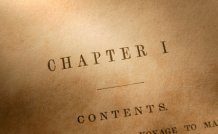Online Class: Poetry Writing 101

no certificate
with CEU Certificate*
-
13Lessons
-
39Exams &
Assignments -
3,303Students
have taken this course -
17Hours
average time -
1.7CEUs
Course Description
This poetry course is created for the lover of poetry who wants to learn how to appreciate the art even more. It is also for student poets who want to improve their craft. This course is thorough in teaching all students everything they need to know about reading, interpreting, and writing poetry. This course is a must-take for any budding poet out there who wants to hone their skills and learn to write high quality, great poetry that others will appreciate.
Through various assignments and essays, each student will learn to do the following:
- Determine and understand the meanings of poems.
- Recognize and utilize the devices used in writing poetry.
- Understand the theory and history of poetry to strengthen their skills and appreciation.
- Write different types of poetry.
- Become a skilled, knowledgeable poet or lover of the art.
- Identify different types of poetry.
- Create a chapbook suitable for publication.
- And much more.
Course Motivation
Great poetry is not the ability to string together flowery phrases, or to say something so nonsensical that it sounds poetic and intelligent only to the ignorant. Great poetry can be understood by anyone who reads it. And writing great poetry means having the ability to write about the ordinary in a way that's never been stated before. Poetry is a beautiful art, and it's an art that you're going to learn about in-depth throughout every lesson in this course.
You will learn:
- The terminology, form, and devices used in poetry.
- To recognize and understand the terminology, forms, and devices in great and classical poetry. You'll study poems by Frost and Dickinson, to name a few.
- Why the terms, forms, and devices are critical aspects of great poetry.
- How to apply these things to your own poetry.
You will be taught these things in each of the lessons, then be asked to demonstrate what you've learned through various assignments. It is important that you complete each assignment given in this course, not just to achieve a passing grade, but to also take away the in-depth comprehension of poetry so you can begin to effortlessly apply it to your own work.
You will be asked to:
- Complete lesson assignment exercises. Lesson exercises are placed at the end of each lesson to test your comprehension of the material covered by asking you questions. You need to complete the lesson exercises right away before advancing.
- Complete lesson reviews quizzes. Lesson reviews are located at the end of each lesson, and cover terminology and definitions of the material covered. These should be completed at the end of each lesson before advancing.
- Write poetry to include in your chapbook. There will be places in this course where you will be asked write your own poem by applying devices or techniques you've just learned, then placing them in your chapbook template. All poems that you write for this are required to be no longer than 50 lines. It is hard to write a great long poem, and it is important that you learn to write great, shorter poems first. Poetry assignments appear in boxes. These poems will not be submitted to your instructor. They are just for your practice.
- Write essays. There is an essay assignment at the end of each lesson. These essays must be completed because they challenge you to think about what you've learned and appreciate why it's important to poetry. Essays must be no longer than 1500 words.
Poetry is an art form that is older than literature, itself, and dates back to ancient times. It is used as a form of communication, a way to tell a story, and a way to express emotion. Throughout this course, you're going to learn how poetry is used to achieve all of these things by studying its form, devices, and by reading the poems of some of the greatest poets of all time. You'll learn to recognize the elements of poetry, which will help you to understand and write it.
However, before we delve into this course, it's important to start out by discussing what poetry is not. There's a common misconception, especially since the boom of the Internet, that poetry is a form of self expression that is void of any rules or form. While it's true that a poem can be a very beautiful means of expression, it is not true that there aren't any forms or rules to it. There are devices and techniques that set poetry apart from other forms of literature, and it's applying those things to your own writing that will determine how great a poet you are.
In modern times, and especially in our culture, we tend to think of poetry as the expression of emotion. How can we not, when poetry lines the inside of every greeting card, when it's something romantic that we write for a loved one, and when it's so lyrical that it brings out our emotions or sticks in our heads for a long time to come.
But the truth is, the original meaning and use for poetry had nothing to do with emotion. Poetry dates back to prehistoric times and out-dates literacy itself. The oldest surviving poem, The Epic of Gilgamesh, was written in 3000 BC on clay tablets.
When it originated, poetry was used as a form of record keeping. Ancient societies wrote poems to record cultural events, laws, and to tell stories (epic poetry). The rhythm, beat, and rhyme of poetry made things easy to memorize and aided in accurate oral transmission.
While there are several forms of written poetry you can use, there are a few basic components and terms that are familiar to most poetry you will read. Whenever you read a story, you know the story will contain whole sentences. From there, the sentences are divided into lines. The length of those lines are determined by the margins set for the page, with a new line only beginning when the words reach the right margin. Then, the sentences and lines are broken up into paragraphs. Paragraphs make long text easier to read and, oftentimes, a new paragraph means a new thought, subject, or direction. Poetry is different.
You can write: The girl went to the store
With lightning at her heels.
But you couldn't write: The girl went to the store
The boy went to the dentist.
In the first example, the words in the two lines are closely related because they both talk about the girl. It is a correct use of enjambment. The second example features two lines that are unrelated. Using an enjambment here would be incorrect. Instead, you'd need some form of punctuation.
Unlike text, where long passages are broken up into paragraphs, poetry uses stanzas. A stanza is equal to a verse. It can be defined as a group of lines whose pattern repeats throughout the poem. Think of a stanza as a "paragraph within a poem"-- each stanza is divided by a space.
- Completely Online
- Self-Paced
- 6 Months to Complete
- 24/7 Availability
- Start Anytime
- PC & Mac Compatible
- Android & iOS Friendly
- Accredited CEUs

Course Lessons
Lesson 1: Introduction: The Art of Poetry
 Lesson 1 Video
Lesson 1 Video Lesson discussions: Reasons for Taking this Course
Lesson discussions: Reasons for Taking this Course Complete Assignment: An Introduction
Complete Assignment: An Introduction Complete: Lesson 1 Assignment
Complete: Lesson 1 Assignment Complete Assignment: Lesson 1 Essay
Complete Assignment: Lesson 1 Essay Assessment: Lesson 1: Introduction
Assessment: Lesson 1: Introduction
Lesson 2: Irony and Tone
 Lesson 2 Video
Lesson 2 Video Review Practice Worksheet: Chapbook.rtf
Review Practice Worksheet: Chapbook.rtf Complete Assignment: Lesson 2 Essay
Complete Assignment: Lesson 2 Essay Assessment: Lesson 2: Irony and Tone
Assessment: Lesson 2: Irony and Tone
Lesson 3: Denotation and Connotation
 Lesson 3 Video
Lesson 3 Video Complete: Lesson 3 Assignment A
Complete: Lesson 3 Assignment A Complete: Lesson 3 Assignment B
Complete: Lesson 3 Assignment B Complete Assignment: Lesson 3 Essay
Complete Assignment: Lesson 3 Essay Assessment: Lesson 3: Denotation and Connotation
Assessment: Lesson 3: Denotation and Connotation
Lesson 4: Literal and Figurative Meanings
 Lesson 4 Video
Lesson 4 Video Complete: Lesson 4 Assignment A
Complete: Lesson 4 Assignment A Complete: Lesson 4 Assignment B
Complete: Lesson 4 Assignment B Complete Assignment: Lesson 4 Essay
Complete Assignment: Lesson 4 Essay Assessment: Lesson 4: Literal and Figurative Meanings
Assessment: Lesson 4: Literal and Figurative Meanings
Lesson 5: Poetic Devices A-I
 Lesson 5 Video
Lesson 5 Video Complete Assignment: Lesson 5 Essay
Complete Assignment: Lesson 5 Essay Assessment: Lesson 5: Poetic Devices A-I
Assessment: Lesson 5: Poetic Devices A-I
Lesson 6: Poetic Devices J-Z
 Lesson 6 Video
Lesson 6 Video Complete: Lesson 6 Assignment A
Complete: Lesson 6 Assignment A Complete: Lesson 6 Assignment B
Complete: Lesson 6 Assignment B Complete: Lesson 6 Assignment C
Complete: Lesson 6 Assignment C Complete Assignment: Lesson 6 Essay
Complete Assignment: Lesson 6 Essay Assessment: Lesson 6: Poetic Devices J-Z
Assessment: Lesson 6: Poetic Devices J-Z
Lesson 7: Rhyme and Meter
 Lesson 7 Video
Lesson 7 Video Complete: Lesson 7 Assignment A
Complete: Lesson 7 Assignment A Complete: Lesson 7 Assignment B
Complete: Lesson 7 Assignment B Complete Assignment: Lesson 7 Essay
Complete Assignment: Lesson 7 Essay Assessment: Lesson 7: Rhyme and Meter
Assessment: Lesson 7: Rhyme and Meter
Lesson 8: Symbolism and Archetypes
 Lesson 8 Video
Lesson 8 Video Complete Assignment: Lesson 8 Essay
Complete Assignment: Lesson 8 Essay Assessment: Lesson 8: Symbolism and Archetypes
Assessment: Lesson 8: Symbolism and Archetypes
Lesson 9: Cultural Concepts
 Lesson 9 Video
Lesson 9 Video Complete Assignment: Lesson 9 Essay
Complete Assignment: Lesson 9 Essay Assessment: Lesson 9: Cultural Concepts
Assessment: Lesson 9: Cultural Concepts
Lesson 10: Parody and Translation
 Lesson 10 Video
Lesson 10 Video Complete Assignment: Lesson 10 Essay
Complete Assignment: Lesson 10 Essay Assessment: Lesson 10: Parody and Translation
Assessment: Lesson 10: Parody and Translation
Lesson 11: Free Verse and Blank Verse
 Lesson 11 Video
Lesson 11 Video Complete Assignment: Lesson 11 Essay
Complete Assignment: Lesson 11 Essay Assessment: Lesson 11: Free Verse and Blank Verse
Assessment: Lesson 11: Free Verse and Blank Verse
Lesson 12: Sound and Meaning
 Lesson 12 Video
Lesson 12 Video Review Practice Worksheet: TURNINGLANGUAGEINTOPOETRY.doc
Review Practice Worksheet: TURNINGLANGUAGEINTOPOETRY.doc Complete: Lesson 12 Assignment
Complete: Lesson 12 Assignment Complete Assignment: Lesson 12 Essay
Complete Assignment: Lesson 12 Essay Assessment: Lesson 12: Sounds and Meaning
Assessment: Lesson 12: Sounds and Meaning
Lesson 13: Types of Poetry and Verse
 Lesson 13 Video
Lesson 13 Video Review Practice Worksheet: READINGANDVERBALTECHNIQUES.doc
Review Practice Worksheet: READINGANDVERBALTECHNIQUES.doc Lesson discussions: Your Opinion Matters: Course Rating; Program Evaluation Follow-up Survey (End of Course); Course Comments
Lesson discussions: Your Opinion Matters: Course Rating; Program Evaluation Follow-up Survey (End of Course); Course Comments Complete Assignment: Lesson 13 Essay
Complete Assignment: Lesson 13 Essay Assessment: Lesson 13: Types of Poetry and Verse
Assessment: Lesson 13: Types of Poetry and Verse Assessment: The Final Exam
Assessment: The Final Exam
Learning Outcomes
- Identify and demonstrate irony and tone.
- Identify and demonstrate denotation and connotation.
- Describe literal and figurative meanings.
- Define poetic devices A-Z.
- Describe rhyme and meter.
- Describe symbolism and archetypes.
- Describe cultural concepts.
- Summarize parody and translation.
- Describe and demonstrate free verse and blank verse.
- Describe sounds and meaning.
- Define types of poetry and verse.
- Demonstrate mastery of lesson content at levels of 70% or higher.
Additional Course Information

- Document Your Lifelong Learning Achievements
- Earn an Official Certificate Documenting Course Hours and CEUs
- Verify Your Certificate with a Unique Serial Number Online
- View and Share Your Certificate Online or Download/Print as PDF
- Display Your Certificate on Your Resume and Promote Your Achievements Using Social Media

Choose Your Subscription Plan
No Certificate / No CEUs
This course only
| Includes certificate | X |
| Includes CEUs | X |
| Self-paced |

|
| Instructor support |

|
| Time to complete | 6 months |
| No. of courses | 1 course |
Certificate & CEUs
This course only
| Includes certificate |

|
| Includes CEUs |

|
| Self-paced |

|
| Instructor support |

|
| Time to complete | 6 months |
| No. of courses | 1 course |
Certificates & CEUs
Includes all 600+ courses
| Includes certificate |

|
| Includes CEUs |

|
| Self-paced |

|
| Instructor support |

|
| Time to complete | 12 Months |
| No. of courses | 600+ |
Certificates & CEUs
Includes all 600+ courses
| Includes certificate |

|
| Includes CEUs |

|
| Self-paced |

|
| Instructor support |

|
| Time to complete | 24 Months |
| No. of courses | 600+ |
Student Testimonials
- "As a beginner poet, this was exactly the course I needed to help develop my knowledge and skills. The course material provided was excellent, as well as the positive feedback from my instructor. I appreciated how quickly assignments and exams were marked. I have printed off course material to use as reference to help me develop my skills and own work. Thank you and I look forward to taking another course sometime soon!" -- Tracey T.
- "I loved the course. Very informative and definitely be of help to me in writing my own poetry. Instructor was very supportive and I appreciated her comments." -- Ken V.
- "The instructor provided feedback on all essays and many exams. That's not only helpful (you get a feeling of whether you're on the right track.. or not), but encouraging as well." -- Jonathan S.
- "This instructor was so knowledgeable as far as explaining all the vocabulary involved in the many forms of poetry." -- Annie P.
- "Fantastic course and instructor." -- Lori B.
- "Instructor really inspired confidence." -- Peter D.
- "I enjoyed having you as a teacher thank you very much." -- Susan B.
- "Very efficient." -- Richard W.
- "I really appreciated that the instructor asked for essays in each section. This clearly demonstrates much more commitment to teaching the course than self grading T/F and Multiple Choice exams - though these were used as well...I sought assistance from the Instructor so often I was concerned about being a pest. Without fail, the instructor was there with direct answers or responses, and though I'm certain she had other priorities, I always got a response NLT @12 hrs. Amazing commitment - almost like being in the classroom." -- William O.
- "I think that the whole thing was useful to me. I think the instructor was excellent in this field of study...she really knew what she was doing, and what she was talking about." -- Joslyn A.
Related Courses
-
 87 hours
8.7 CEUs
Writing Help Course Bundle
$135.00
87 hours
8.7 CEUs
Writing Help Course Bundle
$135.00
-
 19 hours
1.9 CEUs
Creative Writing 101
$95.00
19 hours
1.9 CEUs
Creative Writing 101
$95.00
-
 11 hours
1.1 CEUs
Punctuation and Grammar 101
$80.00
11 hours
1.1 CEUs
Punctuation and Grammar 101
$80.00
-
 11 hours
1.1 CEUs
Humor Writing 101
$95.00
11 hours
1.1 CEUs
Humor Writing 101
$95.00
-
 12 hours
1.2 CEUs
Romance Writing
$95.00
12 hours
1.2 CEUs
Romance Writing
$95.00
-
 12 hours
1.2 CEUs
Screenwriting 101
$95.00
12 hours
1.2 CEUs
Screenwriting 101
$95.00
-
 12 hours
1.2 CEUs
Advertising, Marketing and Sales Writing
$95.00
12 hours
1.2 CEUs
Advertising, Marketing and Sales Writing
$95.00
-
 9 hours
0.9 CEUs
ABCs of Technical Writing
$95.00
9 hours
0.9 CEUs
ABCs of Technical Writing
$95.00
-
 12 hours
1.2 CEUs
Philosophy 101
$95.00
12 hours
1.2 CEUs
Philosophy 101
$95.00
-
 9 hours
0.9 CEUs
Mystery Writing
$95.00
9 hours
0.9 CEUs
Mystery Writing
$95.00
-
 6 hours
0.6 CEUs
Freelance Writing 101
$95.00
6 hours
0.6 CEUs
Freelance Writing 101
$95.00
-
 23 hours
2.3 CEUs
Historical Fiction Writing
$95.00
23 hours
2.3 CEUs
Historical Fiction Writing
$95.00
-
 14 hours
1.4 CEUs
Writing Improvement 101
$95.00
14 hours
1.4 CEUs
Writing Improvement 101
$95.00
-
 7 hours
0.7 CEUs
Writing Women's Fiction
$95.00
7 hours
0.7 CEUs
Writing Women's Fiction
$95.00
-
 14 hours
1.4 CEUs
Journalism 101
$95.00
14 hours
1.4 CEUs
Journalism 101
$95.00
-
 14 hours
1.4 CEUs
Creative Writing for Beginners
$95.00
14 hours
1.4 CEUs
Creative Writing for Beginners
$95.00
-
 11 hours
1.1 CEUs
Writing Effective Emails in the Workplace
$95.00
11 hours
1.1 CEUs
Writing Effective Emails in the Workplace
$95.00
-
 16 hours
1.6 CEUs
Advertising Copywriter
$95.00
16 hours
1.6 CEUs
Advertising Copywriter
$95.00
-
 12 hours
1.2 CEUs
How to Write Case Studies
$95.00
12 hours
1.2 CEUs
How to Write Case Studies
$95.00
-
 19 hours
1.9 CEUs
Business Writing
$95.00
19 hours
1.9 CEUs
Business Writing
$95.00
-
 5 hours
0.5 CEUs
Writing the Great American Short Story
$95.00
5 hours
0.5 CEUs
Writing the Great American Short Story
$95.00
-
 10 hours
1.0 CEUs
Travel Writing 101
$95.00
10 hours
1.0 CEUs
Travel Writing 101
$95.00
-
 12 hours
1.2 CEUs
Writing Effective Persuasion
$95.00
12 hours
1.2 CEUs
Writing Effective Persuasion
$95.00
-
 22 hours
2.2 CEUs
Novel Writing 101
$95.00
22 hours
2.2 CEUs
Novel Writing 101
$95.00
-
 29 hours
2.9 CEUs
Writing Basics 101: Spelling, Grammar, Punctuation, Writing Structures
$95.00
29 hours
2.9 CEUs
Writing Basics 101: Spelling, Grammar, Punctuation, Writing Structures
$95.00
-
 9 hours
0.9 CEUs
Nonfiction Writing 101
$95.00
9 hours
0.9 CEUs
Nonfiction Writing 101
$95.00
-
 12 hours
1.2 CEUs
Paranormal Romance Writing
$95.00
12 hours
1.2 CEUs
Paranormal Romance Writing
$95.00
-
 7 hours
0.7 CEUs
American Literature Review
$115.00
7 hours
0.7 CEUs
American Literature Review
$115.00
-
 17 hours
1.7 CEUs
Poetry Writing 101
$95.00
17 hours
1.7 CEUs
Poetry Writing 101
$95.00
-
 9 hours
0.9 CEUs
Resume Writing 101
$95.00
9 hours
0.9 CEUs
Resume Writing 101
$95.00
-
 11 hours
1.1 CEUs
How to Write Short Stories for Children
$95.00
11 hours
1.1 CEUs
How to Write Short Stories for Children
$95.00









